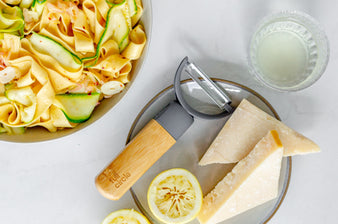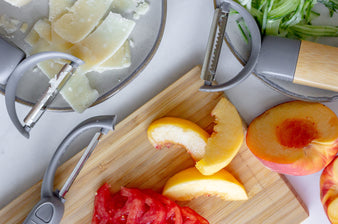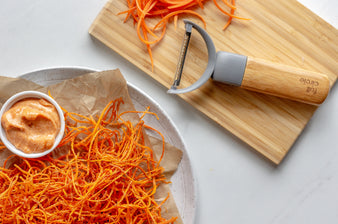Making Material Certifications Cool
Aching for some acronyms? We’ve got plenty. While it might not seem like a few letters of the alphabet can have much of an impact, they’re one of the best ways we can ensure that the materials we use are sourced in an ethical and sustainable way.
Let’s demystify some of our material certifications—which are backed up by third-party testing and audits and actually mean something (sorry to all the meaningless “all natural” labels out there).
GRS:
It’s great to see when brands use recycled materials, but when “green is the new black” and sustainability is trendy, some brands have been known to stretch the truth when it comes to what’s been “recycled” and whether their products contain 99% recycled materials—or just 2%.
To give consumers some peace of mind, the Global Recycle Standard (GRS) was developed in 2008 and is now administered by the Textile Exchange—a global non-profit committed to minimizing the negative impact of sourcing and manufacturing on people and the environment.
Not only does the voluntary GRS standard certify that, in fact, a product has been made from recycled content, but it also ensures that the products are processed in a sustainable way that minimizes harmful impacts on people and the planet.
With this certification and with our patented RFID technology, we let you know exactly how much post-consumer recycled plastic is in each product—and we’ve got the traceability to back it up.
So, when you see these three letters in products like our Stash Modular Ceramic Sink Caddy or Wipe Out squeegee, you can rest assured that you’re cleaning up your bathroom or kitchen with a product made by cleaning up our planet.
GOTS:
The Global Organic Textile Standard (GOTS) is hands-down the best way we can assure that our organic cotton has been produced in a socially and ecologically sound way.
Let’s get into the nitty-gritty of our favorite organic textile. When you see the GOTS label on our organic cotton products (like our Tidy Dish Cloth), you can be certain that it’s been:
- Made with at least 95% certified organic natural fibers.
- Made without toxic chemical inputs, genetically modified organisms (GMOs), toxic heavy metals, chlorine bleach, and carcinogenic dyes.
- Made in a way that minimizes waste.
- Made by workers who are respected and enjoy living wages and safe and healthy work environments.
Biobased:
The USDA Certified Biobased Product label is like a big thumbs up from the U.S. Department of Agriculture. It can only be used on products that have been made with renewable biological ingredients in the form of:
- Renewable domestic agricultural materials
- Renewable chemicals
- Renewable forestry or marine materials
Our favorite bioplastic (which we also created), Bonterra™ is made from cellulose (derived from starchy plants, not petrochemicals). The name “Bonterra” translates to “good Earth” and the USDA Certified Biobased label confirms that it contributes to exactly that.




